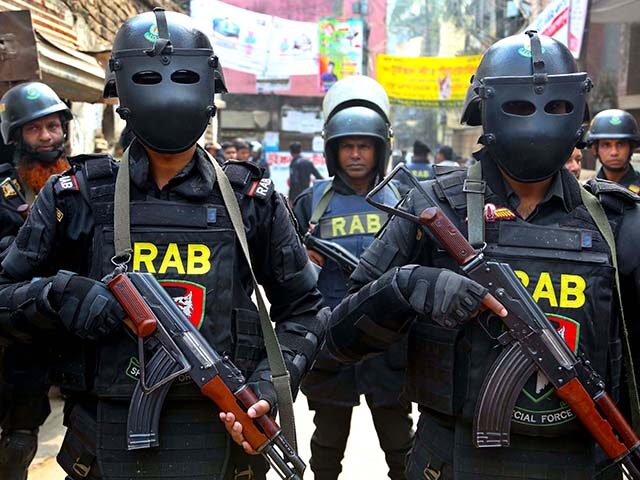A consortium of media agencies in Germany and Sweden reported on Tuesday that members of Bangladeshi and Sri Lankan security units accused of torturing prisoners are being deployed on dozens of U.N. peacekeeping missions, adding another scandal to a string of embarrassments for the United Nations.
Tuesday’s report by Germany’s Deutsche Welle (DW) and Suddeutsche Zeitung, partnered with Sweden’s Netra News, followed up on an investigation conducted in 2023 by DW and Netra. In the 2023 expose, journalists delved into the activities of the Rapid Action Battalion (RAB), an elite security force established by Bangladesh in 2004.
The earlier report uncovered “widespread human rights violations” by the RAB, including “torture, murder, and abductions” targeting “alleged criminals, opposition activists, and human rights defenders.”
The report also found that the RAB “goes to great lengths to cover up its crimes,” operating with “complicity from the highest political level in Bangladesh.”
On Tuesday, DW reported that the Bangladeshi cover-up was apparently good enough to fool the United Nations, as over 100 RAB officers have been spotted wearing blue helmets on U.N. peacekeeping missions, 40 of them within the past five years.
DW and its investigative partners pieced together their evidence by interviewing military and U.N. sources around the world, reviewing military files, and by simply scouring social media for images of RAB officers on U.N. deployments.
Many of the alleged Bangladeshi torturers turned out to be vigorous social media posters when deployed to foreign lands. One of them uploaded his jogging routes every day, painting a literal map of his presence on U.N. missions in Africa.
DW conceded that not every RAB officer has been implicated in human rights abuses, but a few who definitely did belong to the RAB’s notorious “intelligence wing” have been sighted on U.N. deployments, including two of its deputy directors.
Human rights activists said the U.N. is bizarrely willing to let abusive governments investigate themselves and vet their own peacekeepers. This afforded very little protection in the case of Bangladesh, which officially denies most of the torture allegations against the RAB and rarely prosecutes even the most outrageous allegations of abuse.
DW found this especially dismaying because the U.N. has a long and sordid history of peacekeeper abuses, and supposedly implemented major reforms after the debacle in Haiti, where many of the blue helmets were credibly accused of sexually assaulting women and children.
There have been other peacekeeper abuse scandals since then, as well as allegations of abuse by the U.N.’s World Health Organization (W.H.O.) and the bombshell revelation that members of the U.N. relief agency for Palestinians actively participated in the mass rape, murder, and kidnapping of Israeli civilians on October 7, 2023. After each scandal, the U.N. sacks some personnel and promises sweeping reforms to ensure the abuses are not repeated.
While much of the expose by German and Swedish media this week focused on Bangladeshi secret police working as U.N. peacekeepers, the reporters also found evidence that Sri Lankan officers accused of human rights violations during the long and brutal civil war against the Tamil Tigers.
The situation with Sri Lanka’s military is so bad that the U.N. actually promised to stop deploying Sri Lankan troops as peacekeepers in 2019, except “where suspension would expose U.N. operations to serious operational risk” – a caveat that is difficult to reconcile with U.N. assurances that a few “bad apples” cannot jeopardize an entire peacekeeping mission.
Apparently there was a great deal of operational risk to be concerned with because, according to DW, the U.N. sent 687 Sri Lankan troops on peacekeeping missions in 2019, and another 665 in 2020.
“Our investigation points to one thing: when it comes to selecting troops, the UN Department of Peacekeeping Operations is faced with a difficult dilemma. It must accept the troops it knows in some cases may have committed abuses or, faced with threats from troop contributing countries to withdraw their contingents, turn a blind eye to uphold the missions it says are saving the lives of the most vulnerable on the ground,” DW concluded.

COMMENTS
Please let us know if you're having issues with commenting.